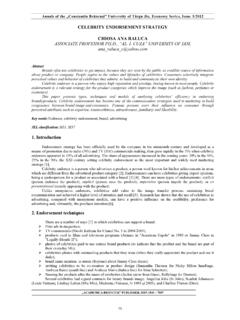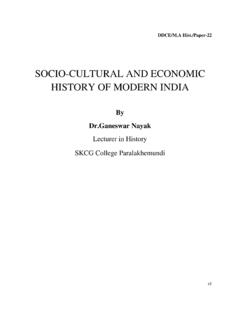Transcription of HISTORY OF GLOBALIZATION
1 Annals of the Constantin Br ncu i University of T rgu Jiu, Letter and Social Science Series, Issue 1/2015 ACADEMICA BR NCU I PUBLISHER, ISSN 1844 - 6051 75 HISTORY OF GLOBALIZATION Mara Ruzana Researcher Assist., Constantin Brancusi University of Targu-Jiu Student, University of Craiova ABSTRACT THE MOTIVATION FOR CHOOSING THIS THEME IS THE GROWING IMPORTANCE WHICH HAS GLOBAL APPROACH TO BUSINESS MARKET ECONOMY OF THE NEW MILLENNIUM. GLOBALIZATION HAS BECOME A FASHIONABLE CONCEPT IN VARIOUS FIELDS OF SCIENTIFIC RESEARCH, BUT ALSO AMONG JOURNALISTS THAT ANALYZES THE POLITICAL AND socio -ECONOMIC PHENOMENA. THE PAPER PRESENTS A BRIEF HISTORY OF THE DEVELOPMENT OF THE CONCEPT OF GLOBALIZATION AND SOME ASPECT OF MYTHOLOGY AND IDEOLOGY BLOBALIZ RII DIFFERENT SIZES.
2 KEYWORDS: GLOBALIZATION , DIMENSIONS OF GLOBALIZATION , MYTHOLOGY, GLOBAL COMMUNITY 1. Ideologies of GLOBALIZATION The term GLOBALIZATION was first used in the publication "Towards New Education" in 1930. Since the 60s the term began to be widely used by both economists and sociologists. McLuhan introduced in a paper published in 1962 deadline for Global Village (global village), adopted within political scientists and sociologists used quickly. McLuhan introduce this concept in order to describe the new way of communication between different regions of the world based on radio communication[1]. By changing worldview liberal and communist ideology continued GLOBALIZATION of world revolution directly. The revolutions often overlap or come as the unit ages pass between them.
3 The language is the language of revolutionary globalists. Our age is not only a revolutionary but we can say that we have entered a new phase of transformation, which by its historical and human effects will lead to a new structure and a new world order As GLOBALIZATION is a revolutionary ideology. Revolution as a global practice constantly has to do with movement, revival and spread of revolutions, in all its forms and global standing. GLOBALIZATION is a "phenomenon of transforming the world into a unit, which manifests world-wide, by specific means."[2] Thus, GLOBALIZATION seeks feedback between different civilizations and cultures to promote a new international order, which in turn ensure stability, sustainable development, security and peace.
4 GLOBALIZATION is a phenomenon historically manifested in different places in different forms, depending on the conditions and possibilities that era were held. The first Annals of the Constantin Br ncu i University of T rgu Jiu, Letter and Social Science Series, Issue 1/2015 ACADEMICA BR NCU I PUBLISHER, ISSN 1844 - 6051 76 manifestations of GLOBALIZATION were particularly intertwined with the twentieth century. During the same period capitalism has grown development, although they could speak of capitalism ever since the physiocrats. In this regard GLOBALIZATION Provo development of capitalism in the international sphere. The consequences of World War I, the Russian revolution, the crisis of 1929-1933, considered the greatest crisis of capitalism were slowed by GLOBALIZATION .
5 Also then began the process of decolonization, independence of nations, colonies and dominions, in parallel with the establishment of economic and military rival blocs and the establishment of dictatorships. Thus, both GLOBALIZATION and capitalism have suffered because there were problems or interstate conflicts.[3] The effects of the Second World War fundamental changes in global development. UTA was a new political-territorial map and a new hierarchy of states have established regional and global institutions, decolonization was completed, was consolidated nation-state, have developed international law and diplomatic activity. During this period it came to finding the best shape for stability, security and peace in the world. Also in this period are present and visible challenges extiderii capitalism.
6 As regards GLOBALIZATION as a science, it differs from other forms of social knowledge in that these forms are limited to a well defined framework. If GLOBALIZATION is spoken of social consciousness which relates to "the whole planet .. and meet both societal elements other forms of social consciousness."[4] GLOBALIZATION involves as many dimensions as the entire social life: political, legal, cultural, ethical. Science superstructure GLOBALIZATION belongs in nature. Like other forms of superstructure as well as the political, economic, legal, sociological, etc., it is made of the relationship between side instito ional human social relations. The current process of GLOBALIZATION means the transfer of information technology, financial markets, armament is ultimp generation finds its place in the ideology of GLOBALIZATION .
7 Nowadays, it is the biggest "change" in all possible .. Important that " GLOBALIZATION project", formulated in the third part of the twentieth century, appears uniform, and replaces two political ideologies: Liberalism and Communism. From the historical point of view more than 400 years, since the religious wars of the sixteenth century and ending with the Club of Rome with apelurule the "world revolution", we constantly deal with movement, renaissance and spread of revolutions, in all forms. 2. Mythology of GLOBALIZATION If we talk about a mythology of GLOBALIZATION we can say that it is a set of stereotypes contradictory or mutually exclusive, created by various forms of opposition and alternative forms, who was told about this trend in the early 90s.
8 The clash of two poles on GLOBALIZATION , new international order on the one hand and individualization or identity on the other hand, led to a harsh international debate (global talk), then surfaced all "postulates" core mythology of GLOBALIZATION . Thus, GLOBALIZATION is the process: - inevitably fatal, fateful; - universalization or leveling of all differences - from economic to cultural; - Westernization and Americanization; - unidirectional, ie no alternative; Annals of the Constantin Br ncu i University of T rgu Jiu, Letter and Social Science Series, Issue 1/2015 ACADEMICA BR NCU I PUBLISHER, ISSN 1844 - 6051 77 - delete not only the differences but also eliminate inequalities sovereign state. In contrast to all these stereotypes of "the mainstream" globalizing other acts opposite pole of GLOBALIZATION .
9 So globalizing process: - is not predetermined or inevitable; - has an alternative in the form of national identity Westernization or Americanization and opposes; - is equal and disintegrated as a world where global capitalist system prevails. As seen in these debates, GLOBALIZATION mythology with these dual structure establishes poles world leadership. 3. Dimensions of Globalisation Space-time dimension of GLOBALIZATION Spatial and spatio-Temora aspect of GLOBALIZATION , finds its reflection especially historical ramifications. GLOBALIZATION (equivalent GLOBALIZATION ) appears as a transactional process generated by all possible exchanges between different parts of the world, which is true for capitalism. The GLOBALIZATION is a reaction to international companies in order to increase their influence in the world.
10 This process occurs from the fifteenth century and a modern take secolulul the end of the nineteenth century. Development and GLOBALIZATION opzi ie them appear in some social stereotypes: socio -centrism and to total system approach. socio -centrism has roots in classical sociology (XIX-XX centuries), both liberal and Marxist. Sociocentrismul is focused on existential issues (survival) and anthropological. Peter Saunders invites us to understand that capitalist society is the result of natural evolution of humans, to progress and civilization, and that basically means saving capitalism and not ideology. "If we're talking about capitalism must speak in the language of victory, because it appears as a victory for science, progress, freedom and economy.

















